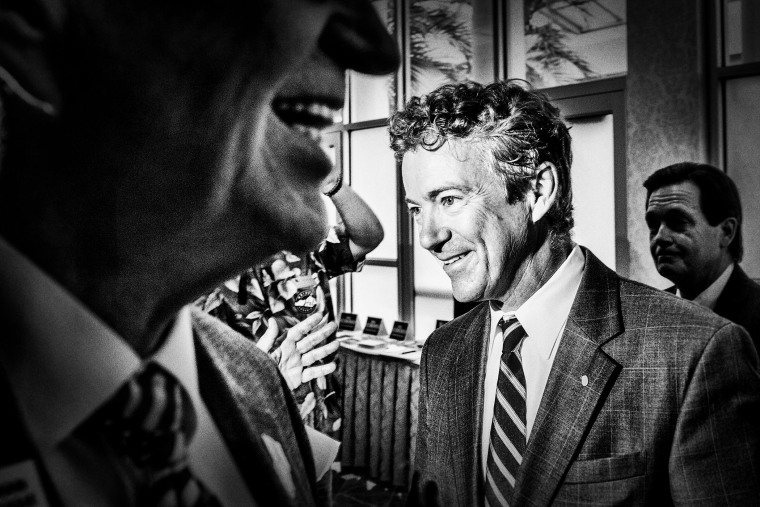Things might get weird in 2016 when it comes to foreign policy.
After a decade in which Republicans championed an aggressive unilateral foreign policy under President Bush and Democrats rallied behind a more measured international approach under President Obama, the battle lines are getting blurry as presidential season approaches.
On the Republican side, Kentucky Sen. Rand Paul has long been out of step with the party’s hawkish wing, favoring a policy of “non-interventionism” that includes, with some hedging, ending all foreign aid and aggressively scaling back American military involvement abroad. While he’s smoothed some of the harsher edges of his father, former Texas Rep. Ron Paul’s, policy vision (which is less friendly to Israel and a lot more friendly to dictators), it still would represent a massive shift from the more active approach favored by every modern president.
"The broad dynamics of the Clinton and Paul kerfuffles suggest that the general election would be fought on a bizarre role reversal."'
On the Democratic side, Hillary Clinton has been distancing herself from the White House. Almost every break with the administration so far puts her further to Obama’s right, alarming some liberal doves who fear she hasn’t learned from a 2008 primary loss fueled by anger over her vote to authorize the Iraq War.
Paul has made clear in recent weeks that the foreign policy debate will be at the center of his likely presidential campaign, in Sunday show appearances, op-eds and statements criticizing America’s increased involvement in the Middle East. On Thursday, he published an op-ed in The Wall Street Journal accusing officials like Clinton, who supported backing moderate Syrian rebels in their war against dictator Bashar al-Assad, of indirectly encouraging the rise of the Islamic State of Iraq and Syria (ISIS).
The reactions from politicians and commentators to each of these developments, in particular Paul’s op-ed, scrambled partisan lines.
“Simply put, if Rand Paul had a foreign policy slogan, it would be -- The Rand Paul Doctrine: Blame America. Retreat from the World,” a spokesman for the Democratic National Committee, Michael Czin, said in a statement.
The “blame America” and “retreat” lines recalled similar attacks leveled against Democrats like John Kerry throughout the Bush era. As if Democrats needed a reminder, former Senator Rick Santorum, an old Bush ally, e-mailed supporters a statement that sounded many of the same notes.
“Senator Paul is wrong, and his policies are wrong for America's security and prosperity,” Santorum wrote. “We cannot defend liberty at home by ignoring threats abroad. This is not the time for neo-isolationism and reckless retreats.”
The DNC’s reaction made some liberal commentators deeply uncomfortable. Vox’s Ezra Klein decried it as “brain-dead patriotism-baiting that Democrats used to loathe” and noted that elements of Paul’s arguments about ISIS were reflected in Obama’s own skepticism towards military engagement in Syria. Klein, along with a number of other progressive columnists and former White House advisor David Axelrod, delivered a rebuke to Clinton as well after she criticized Obama’s foreign policy from the right in an interview with The Atlantic.
Czin noted to msnbc that there are major substantive differences between Paul and Democrats in 2004. He’s right: Kerry, now Secretary of State, was far from an anti-interventionist and devoted his Senate career to cultivating an active foreign policy. No prominent Democratic leaders have supported eliminating foreign aid, nor do they share Paul’s intense skepticism of international institutions.
The broad dynamics of the Clinton and Paul kerfuffles suggest that the general election would be fought on a bizarre role reversal, however. Clinton, possibly with help from prominent Republican hawks, would attack Paul hard from the right. Paul, perhaps with support from some progressive doves, would attack from the left. There’s no modern precedent to tell us what might happen next.
